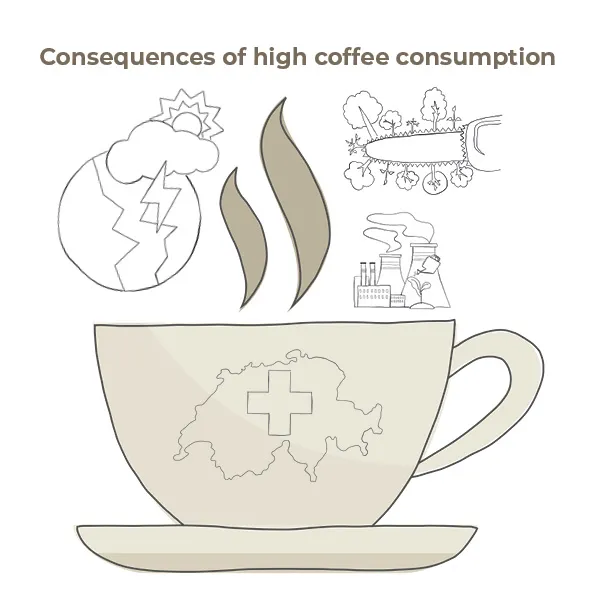Header
Hauptnavigation

Georgina Mrose
Deforestation
A consequence of Switzerland‘s high coffee consumption
Helping people in Switzerland buy coffee responsibly to reduce negative environmental impacts.
Problem
In today’s world, climate change forces us to shift toward responsible and sustainable consumption. Due to Switzerland’s growing demand for coffee, Swiss inhabitants must become more aware of the consequences that arise from high consumption. With Switzerland being one of the biggest coffee consumers worldwide and the average person drinking three cups of coffee per day, the negative environmental impacts need to be brought closer to the consumers – 75% of coffee imports for Switzerland come from countries at high risk of deforestation.
Strategy
This thesis focuses on teaching and sharing information with coffee consumers, and the aim is for them to become aware of the consequences and encourage responsible and sustainable buying behaviour.
As a design management student, my role was to gain a deeper understanding of my topic and focus on one problem within the coffee industry – deforestation due to Switzerland’s high demand for coffee. I conducted surveys, interviews and observations at retail shops to better understand Swiss coffee drinkers‘ drivers and values towards coffee and sustainable consumption. The gained findings assisted in defining design criteria used to develop an intervention concept to prototype, test and implement.
Intervention
Through research, it became clear that the problem consisted of consumers‘ lack of awareness of the negative social and environmental impacts of high coffee consumption and the lack of knowledge of sustainability in the coffee industry. Therefore, the intervention of this thesis aims to bring consumers closer to understanding the meaning of sustainable coffee consumption by increasing awareness of deforestation and the negative environmental impacts it causes in coffee-growing countries. Also, it builds upon pre-existing means used to identify sustainable or ethical production by teaching consumers about certification schemes.





0 Kommentare